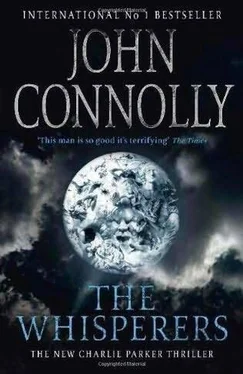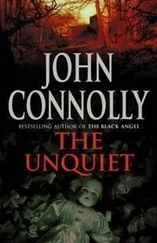‘And you came to me because you figure Tobias is augmenting his cargo illegally to make ends meet, and I’d know about it if he was.’
‘Jimmy, you know about stuff even God doesn’t know about.’
‘That’s because God is only interested in his own cut, and we all pay that, eventually, so God can afford to wait. I, on the other hand, am always seeking to expand.’
‘So, Joel Tobias.’
Jimmy shrugged. ‘I don’t have much to tell you about this guy, but what I do have you won’t like…’
Jimmy knew the ways of the border. He was familiar with every road, every inlet, every secluded cove in the state of Maine. He worked for himself largely in the sense that he was an agent for a number of criminal organizations who were often happy to remain at one remove from the illegal activities that funded them. Booze, drugs, people, money: whatever needed to be transported, Jimmy would find a way to do it. Longstanding bribes were in place, and there were men in uniform who knew when to look the other way. He used to say that he had more people on his payroll than the government, and his jobs were more secure.
The events of 9/11 changed things for Jimmy and others like him. Border security was tightened, and Jimmy was no longer able to guarantee deliveries without a hitch. The bribes grew larger, and some of his inside men quietly told Jimmy that they couldn’t take the risk of working for him anymore. A couple of shipments were seized, and the people whose goods he was transporting weren’t happy about it. Jimmy lost money, and clients. But the economic downturn had also helped some: cash was scarce, jobs were disappearing, and under those circumstances, smuggling seemed like a pretty good option to men who were struggling to weather hard times. But even though Jimmy was always in need of good help, he was careful about those whom he employed. He wanted people who could be trusted, who wouldn’t show signs of panic when the dogs began sniffing around their trucks or their cars, who wouldn’t decide to take a chance on ripping Jimmy off and making a run for it with the proceeds. Only newbies did stuff like that. The older ones knew better. Jimmy might have seemed like a genial guy, but Earle wasn’t. Earle would break a kitten’s legs for spilling its milk.
And if Earle couldn’t handle the situation, which was rare, Jimmy had friends everywhere, the kind of friends who owed him and knew where to look for anyone dumb enough to cross Jimmy Jewel. And since newbies only got consignments to transport worth a low-five-figure sum at most, there was a limit to how far any of them could run, assuming they could access the ‘traps’, the hidden storage compartments, to begin with. Even those who did run inevitably ended up back where they came from, because Jimmy also made sure that he employed people who had friends and family within easy reach. Either the offending parties would return of their own volition, largely because they missed the company, or they would be encouraged to return in order to avoid trouble for those close to them. Then a beating would follow, and a sequestration of assets or, in the absence of any such assets, a couple of risky, dirty jobs done for little or no payment as a gesture of atonement. Jimmy resisted punishments that were terminal as they drew unwanted attention to his operations, but that wasn’t to say that people had not died for crossing Jimmy Jewel. There were bodies buried in the Great North Woods, but Jimmy hadn’t put them there. It was just that, sometimes, clients emerged who resented the disruption caused to their affairs by someone running off with their cash or their drugs, and who insisted upon an example being made pour décourager autres, as some of his Quebeçois contacts liked to put it. In such cases, Jimmy did his best to plead for leniency, but if his pleas fell on deaf ears, Jimmy had always made it clear that he wasn’t about to cap anyone, because that wasn’t the way he worked, and the finger on the trigger wouldn’t belong to any of his people. Nobody ever complained about Jimmy’s position on this matter, mainly because there were always men who were happy to dim some unfortunate’s lights, if only to keep themselves fresh and in the game.
Jimmy never put pressure on anyone to work for him. He was content to make a delicate approach, sometimes through a third party, and, if that approach was rebuffed, to move on elsewhere. He was patient. Often, it was enough to sow the seed and wait for a change in financial circumstances to occur, at which point his offer might be reconsidered. But he kept tabs on the local truckers, and he was always listening up for rumors of excessive cash being thrown around, or someone picking up a new rig when common sense would suggest that he should barely have been able to maintain the old one. If there was one thing Jimmy didn’t care for, it was competition, or smart guys trying to run independent operations, however small in scale. There were some exceptions to that rule: he was rumored to have a sweet deal with the Mexicans, but he wasn’t about to try to reason with the Dominicans, or the Colombians, or the bikers, or even the Mohawks. If they wanted to avail themselves of his services, as they sometimes did, that was fine, but if Jimmy Jewel started questioning their right to move product, he and Earle would end up tied to chairs in the Sailmaker with pieces of themselves scattered by their feet, assuming their feet weren’t among the scattered pieces, while the bar burned down around their ears, assuming they still had ears.
That was how Joel Tobias had come to Jimmy’s attention. He had a rig, a truck, a house, but he wasn’t making the kind of runs that would enable him to keep them all for long. The figures didn’t add up, and Jimmy had begun to make some gentle inquiries, because if Tobias was smuggling drugs then those drugs had both to come from somewhere and to go somewhere, once they’d crossed the border, and there were only a limited number of possible options in either case. Booze was unwieldy, and didn’t bring in enough dough for the risk, and as far as Jimmy could tell Tobias was using the monitored crossings, which meant that he’d be subject to regular searches, and unless he was being provided with some very high-class documentation his career as a booze smuggler would be short. That left cash, but, again, large dollar amounts had to come from somewhere, and Jimmy had cornered the market in that particular specialty. Anyway, the actual physical movement of cash was also a very minor part of his operation, as there were easier ways to transport money from place to place than in the trunk of a car or the cab of a truck. So Jimmy was very curious indeed about Joel Tobias, which is why he decided to approach him directly one day when Tobias was drinking alone over at Three Dollar Dewey’s after making a legitimate delivery to a warehouse on Commercial. It was four in the afternoon, so the evening rush hadn’t yet hit Dewey’s. Jimmy and Earle joined Tobias at the bar, one on either side of him, and asked if they could buy him a drink.
‘I’m good,’ said Tobias, and went back to reading his magazine.
‘Just trying to be friendly,’ said Jimmy.
Tobias had glanced at Earle in response. ‘Yeah? Your buddy has friendly written all over him.’ Earle had friendly written all over him the way that a plague rat had ‘Hug Me’ emblazoned on its fur.
Tobias didn’t appear disturbed or frightened. He was a big guy; not as big as Earle, but better toned. Jimmy knew, from asking around, that Tobias was ex-military. He’d served in Iraq, and his left hand looked chewed up, missing the little finger and its nearest neighbor, but he was in good condition, so it appeared that he’d maintained the habits that he’d learned in the army. He’d also kept up with his old buddies, from what Jimmy could ascertain, which concerned him slightly. Whatever scam Tobias was running, he wasn’t running it alone. Soldiers, former or otherwise, meant guns, and Jimmy didn’t like guns.
Читать дальше












